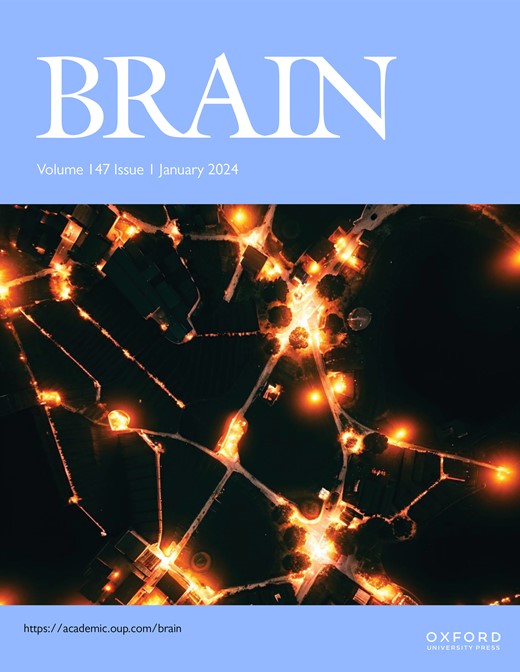一项产前外显子组测序的大型队列研究重新定义了胎儿胼胝体异常的诊断。
IF 11.7
1区 医学
Q1 CLINICAL NEUROLOGY
引用次数: 0
摘要
胼胝体异常(AnCC)是先天性畸形,与高度可变的神经发育结果相关。我们对352例诊断为AnCC的胎儿进行了产前外显子组测序(pES),分析了诊断率、基于异常类型(部分或完全发育不全、胼胝体短或胼胝体发育不良)的相关基因,并评估了对妊娠结局的影响。pES的总体诊断率为23%,在49种不同的基因中鉴定出致病性或可能致病性变异,其中大多数与智力发育障碍有关。在胼胝体发育不良的胎儿中观察到最高的诊断率(46%)。值得注意的是,在胼胝体发育不全的病例中,DCC基因变异是最常见的病因(3.2%,n=9),与良好的神经发育结果相关。所有携带胎儿DCC变异的夫妇都决定继续妊娠至足月。相比之下,有其他基因诊断的夫妇中有73%选择终止妊娠,而没有基因诊断的夫妇中有17%选择终止妊娠。pES提供了基本的预后信息,支持产前决策和护理。识别与有利结果相关的基因,以及将pES整合到产前诊断中,可以增强父母的知情决策,并改善AnCC的临床管理。本文章由计算机程序翻译,如有差异,请以英文原文为准。
A large cohort study of prenatal exome sequencing redefines diagnosis in fetal corpus callosum anomalies.
Anomalies of the corpus callosum (AnCC) are congenital malformations associated with highly variable neurodevelopmental outcomes. We performed prenatal Exome Sequencing (pES) on a cohort of 352 fetuses diagnosed with AnCC, analyzing the diagnostic yield, the implicated genes based on the type of anomaly (partial or complete agenesis, short corpus callosum, or callosal dysgenesis) and assessing the impact on pregnancy outcomes. The overall diagnostic yield of pES was 23%, with pathogenic or likely pathogenic variants identified in 49 different genes, most of which linked to intellectual developmental disorders. The highest diagnostic yield (46%) was observed in fetuses with callosal dysgenesis. Notably, in cases of corpus callosum agenesis, variants in the DCC gene were the most frequently identified etiology (3.2%, n=9), associated with a favorable neurodevelopmental outcome. All couples with a fetal DCC variant decided to continue the pregnancy to term. In contrast, 73% of couples with other genetic diagnoses chose pregnancy termination, compared to 17% in cases without a genetic diagnosis. pES provides essential prognosis information that supports prenatal decision-making and care. The identification of genes associated with favorable outcomes, along with the integration of pES into prenatal diagnosis, enhances informed decision-making for parents and improves the clinical management of AnCC.
求助全文
通过发布文献求助,成功后即可免费获取论文全文。
去求助
来源期刊

Brain
医学-临床神经学
CiteScore
20.30
自引率
4.10%
发文量
458
审稿时长
3-6 weeks
期刊介绍:
Brain, a journal focused on clinical neurology and translational neuroscience, has been publishing landmark papers since 1878. The journal aims to expand its scope by including studies that shed light on disease mechanisms and conducting innovative clinical trials for brain disorders. With a wide range of topics covered, the Editorial Board represents the international readership and diverse coverage of the journal. Accepted articles are promptly posted online, typically within a few weeks of acceptance. As of 2022, Brain holds an impressive impact factor of 14.5, according to the Journal Citation Reports.
 求助内容:
求助内容: 应助结果提醒方式:
应助结果提醒方式:


